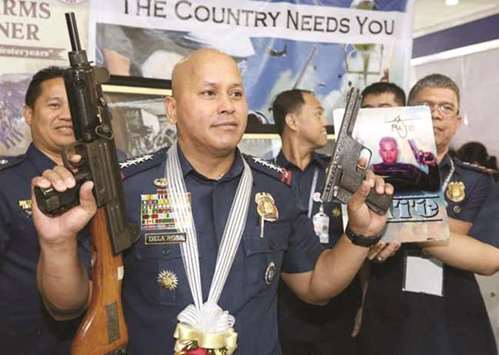The chief of the Philippine National Police (PNP) has admitted that there had been a spike in rape cases, and the drug trade had come back with a vengeance, after the police were taken off the war on drugs.
Director General Ronald “Bato” Dela Rosa said there was likely a “correlation” between the rise in rape cases and the return of the drug trade.
“That’s a fact that is happening. Rape cases lessened dramatically during our war on drugs. Now that we are out of the war on drugs, rape cases increased again,” Dela Rosa said in a news briefing on Friday.
The PNP chief cited the case of Mabel Talaga Cama, a 22-year-old bank employee who was raped, killed and burned inside a bus parking compound in Pasig City on Sunday.
“No person in his right mind would rape and kill a woman, and then burn her. You would not do that if you are not addicted to drugs,” Dela Rosa said.
Dela Rosa pointed out that except for the rape and killing of a five-year-old in the City of San Jose del Monte, Bulacan in July, there were no sensationalised rape cases when the PNP carried out the drug war under “Oplan Double Barrel” and “Oplan Tokhang.”
“When the police’s war on drugs was strong, have you heard of any sensationalised rape case?” Dela Rosa asked.
He also cited PNP data from the first half of the first year of President Rodrigo Duterte’s term, which showed that rape cases dropped by 11.65% from 4,301 cases to 3,800.“Of all the heinous crimes that we monitored during the first six months of our war on drugs, rape dramatically decreased,” Dela Rosa told reporters.
In a statement, the Gabriela Women’s Party expressed “serious concern” over the recent spike in rape-slay cases, “amid assurances by the police that the streets are safer under the Duterte regime.”
Extending its sympathies to the family of the Pasig rape victim, Gabriela said: “We strongly condemn the brutal act committed against Cama, and join the call for justice. We urge the Philippine National Police (PNP) to exhaust all efforts to put perpetrators behind bars.”
Dela Rosa also claimed that the drug problem worsened in some cities in Metro Manila.
When the police led the drug war, drug pushers in Quezon City had moved out or went into hiding, he said. When the police withdrew from the drug war, the opposite occurred.
“They are back again. They’re boasting that they’re untouchables because PNP can no longer operate the drug war. They’re back in business again,” Dela Rosa said.
Dela Rosa however said the PNP had yet to submit its data to Duterte. The police is not “desperate” to go back to leading the anti-drug operations, he said.
In October, Dela Rosa officially terminated anti-illegal drug operations under “Oplan Tokhang” and “Oplan Double Barrel,” under heavy international and local pressure amid the killings of thousands of suspects.
The killings of three teenagers, Kian Loyd De los Santos, Carl Angelo Arnaiz and Reynaldo de Guzman, in August sparked public outrage and drew widespread condemnation.
The PNP had stopped its anti-drug operations in January after the October 2016 killing of Korean businessman Jee Ick Joo by police officers, right inside the PNP’s Camp Crame headquarters, became public.
“Tokhang” and “Double Barrel” however resumed in March under a new PNP anti-illegal drugs unit. “Oplan Double Barrel” had two objectives: first, going after high-value targets or big-time drug dealers, and second, “Oplan Tokhang” wherein policemen supposedly only knocked on the houses of drug suspects to convince them to surrender.
Based on PNP records, at least 3,800 people were killed in anti-drug operations.

Police chief Ronald Dela Rosa has said there was likely a u201ccorrelationu201d between the rise in rape cases and the return of the drug trade.
